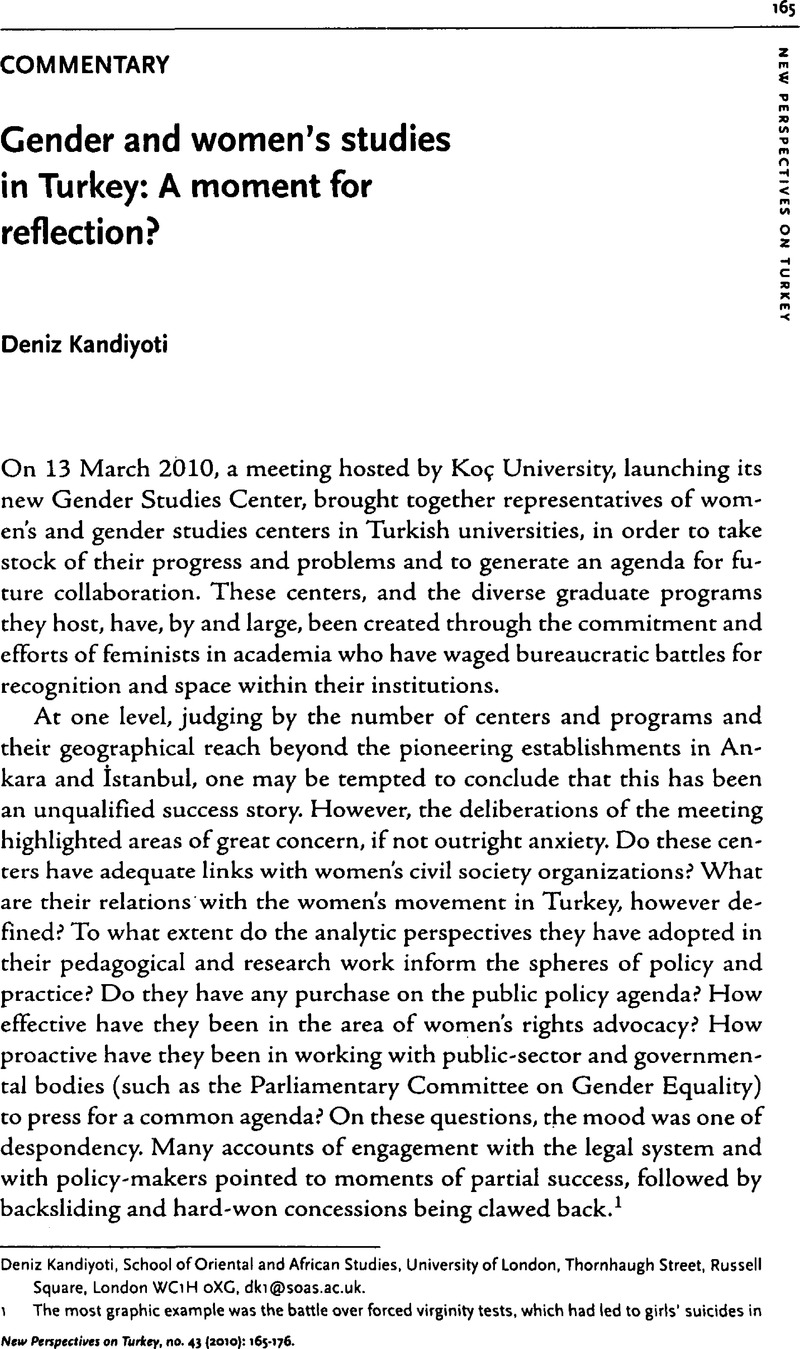Crossref Citations
This article has been cited by the following publications. This list is generated based on data provided by Crossref.
Jelen, Brigitte
2011.
Educated, independent, and covered: The professional aspirations and experiences of university-educated hijabi in contemporary Turkey.
Women's Studies International Forum,
Vol. 34,
Issue. 4,
p.
308.
Dedeoglu, S.
2012.
Equality, Protection or Discrimination: Gender Equality Policies in Turkey.
Social Politics: International Studies in Gender, State & Society,
Vol. 19,
Issue. 2,
p.
269.
Dedeoglu, Saniye
2013.
Veiled Europeanisation of welfare state in Turkey: Gender and social policy in the 2000s.
Women's Studies International Forum,
Vol. 41,
Issue. ,
p.
7.
Bugra, A.
2014.
Revisiting the Wollstonecraft Dilemma in the Context of Conservative Liberalism: The Case of Female Employment in Turkey.
Social Politics: International Studies in Gender, State & Society,
Vol. 21,
Issue. 1,
p.
148.
Cloeters, Gabriele
2016.
Die Türkei im Spannungsfeld von Kollektivismus und Diversität.
p.
127.
Sarıoğlu, Esra
2016.
New imaginaries of gender in Turkey's service economy: Women workers and identity making on the sales floor.
Women's Studies International Forum,
Vol. 54,
Issue. ,
p.
39.
Kandiyoti, Deniz
2016.
Locating the politics of gender: Patriarchy, neo-liberal governance and violence in Turkey.
Research and Policy on Turkey,
Vol. 1,
Issue. 2,
p.
103.
Alnıaçık, Ayşe
Altan-Olcay, Özlem
Deniz, Ceren
and
Gökşen, Fatoş
2017.
Gender Policy Architecture in Turkey: Localizing Transnational Discourses of Women’s Employment.
Social Politics: International Studies in Gender, State & Society,
Vol. 24,
Issue. 3,
p.
298.
Kerestecioğlu, İnci Özkan
and
Özman, Aylin
2017.
Universities in the Neoliberal Era.
p.
181.
Cin, Firdevs Melis
2017.
Gender Justice, Education and Equality.
p.
47.
Kreile, Renate
2018.
Handbuch Interdisziplinäre Geschlechterforschung.
p.
1.
Yelsalı Parmaksız, Pınar Melis
2019.
Thirty years of gender and women's studies in Turkey.
Women's Studies International Forum,
Vol. 77,
Issue. ,
p.
102279.
BOYACİOGLU, İnci
and
HÜNLER, Olga
2019.
Türkiye’de Psikoloji Alanında Kadın Çalışmaları ve Kadın Akademisyenlerin Çalışma Ortamı Üzerine Bir İnceleme - A Study on Women Studies in Psychology and Working Conditions of Women in Academia.
Akdeniz Kadın Çalışmaları ve Toplumsal Cinsiyet Dergisi,
Vol. 2,
Issue. 1,
p.
1.
Kreile, Renate
2019.
Handbuch Interdisziplinäre Geschlechterforschung.
Vol. 65,
Issue. ,
p.
1473.
Montague, Clara
and
Tambe, Ashwini
2020.
Companion to Women's and Gender Studies.
p.
23.
Binder, Charlotte
and
Dağ, Deniz
2020.
Türkeiforschung im deutschsprachigen Raum.
p.
231.
Uzgören, Elif
2021.
Feminist Framing of Europeanisation.
p.
109.
Golan-Nadir, Niva
2022.
Public Preferences and Institutional Designs.
p.
215.
Dedeoğlu, Saniye
2022.
Special dossier editor’s introduction Gender, care, and work in Turkey: from familialism to neo-paternalism.
New Perspectives on Turkey,
Vol. 66,
Issue. ,
p.
4.
Dursun, Ayşe
2022.
Organized Muslim Women in Turkey.
p.
23.



